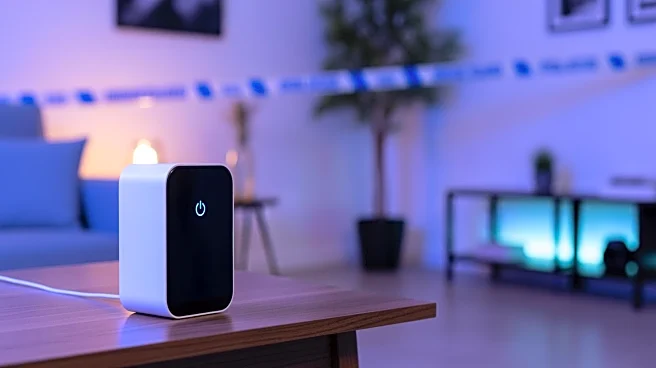What's Happening?
Smart technology is increasingly accessible to renters, offering high-tech features without requiring major changes to living spaces. Devices such as smart plugs, speakers, bulbs, air quality monitors, and security systems provide automation and enhanced
safety. These gadgets are designed to be user-friendly, requiring no drilling or wiring, making them ideal for tenants. Smart plugs, for instance, can automate lamps and chargers, while smart speakers offer voice assistant compatibility and music streaming. Smart bulbs provide mood lighting and can connect to alarms, enhancing home ambiance. Air quality monitors and compact security systems like Arlo sensors offer health benefits and security without permanent installations. These technologies cater to renters' needs for convenience and safety, allowing them to enjoy smart home benefits without landlord permissions.
Why It's Important?
The availability of smart technology for renters signifies a shift in the housing market, where tenants can now enjoy the benefits of smart home features traditionally reserved for homeowners. This development is crucial as it democratizes access to technology, enhancing the quality of life for renters. It also reflects a growing trend towards portable and adaptable tech solutions that cater to transient living situations. Renters gain increased control over their living environment, improving safety, energy efficiency, and comfort. This trend could influence rental property markets, encouraging landlords to consider integrating smart technologies to attract tech-savvy tenants. Additionally, it highlights the importance of innovation in consumer electronics, driving demand for versatile and user-friendly products.
What's Next?
As smart technology becomes more prevalent among renters, manufacturers may focus on developing even more portable and adaptable devices tailored to rental living. This could lead to innovations in smart home technology that prioritize ease of installation and removal, catering specifically to the needs of renters. Landlords might also begin to see the value in offering smart tech-equipped properties, potentially leading to a competitive edge in the rental market. Furthermore, as renters become accustomed to these technologies, there may be increased demand for smart home features in future home purchases, influencing the broader housing market.
Beyond the Headlines
The rise of smart technology for renters also raises questions about privacy and data security. As these devices often connect to the internet, ensuring that renters' data is protected becomes paramount. Manufacturers will need to address these concerns by implementing robust security measures. Additionally, the integration of smart technology in rental properties could lead to discussions about tenant rights and landlord responsibilities regarding tech maintenance and upgrades. This development may also influence cultural perceptions of renting, as tenants gain more autonomy and control over their living spaces.
















